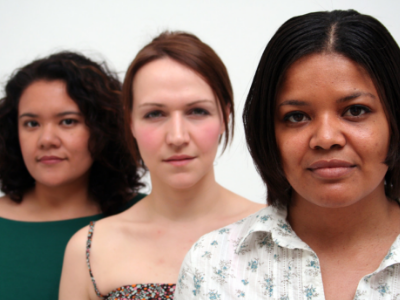While we as a culture work to confront the crisis of sexual violence, we have witnessed waves of survivor disclosures via movements like #MeToo, #TimesUp, and #NotOkay. For the health, safety, and emotional wellbeing of survivors of sexual violence, it is critically important that support providers — including friends and family members — be prepared to provide positive, helpful reactions to survivors who come forward.
This article aims to outline the difference between positive and negative reactions to sexual violence as identified in the fields of clinical psychology and criminology. Our hope is that this piece will better prepare readers to provide loving, compassionate support to the survivors in their lives who choose to disclose, and to contribute to a safer culture for survivors regardless of their disclosure decision.
Positive and Negative Reactions
Social reactions to disclosures of violence have a significant impact on health outcomes for survivors, and are commonly characterized in psychology research as being either positive or negative.1
Positive reactions to disclosures include:
- Providing emotional support (listening, telling the survivor they are brave or strong).
- Providing tangible or informational support (offering to connect the survivor to resources).
- Providing validation or belief.
- Providing non-blame (telling the victim it was not their fault).
Whereas negative reactions to disclosure include:
- Blaming the victim.
- Treating the victim differently (as if they are damaged or incapable of taking care of themselves).
- Attempting to control the victim (forcing them to disclose or to report to law enforcement).
- Egocentric responses (for instance, responding so angrily that the victim is forced to comfort the disclosure recipient rather than receiving comfort themselves).
 While survivors who receive positive reactions to disclosures tend to have better health outcomes and are more likely to formally report their experience, survivors who receive negative reactions to their disclosure may experience heightened PTSD, anxiety, depression, self-blame, avoidance coping, feelings of shame, feelings of guilt, and negative affect.2-5 It is therefore important that individuals learn how best to respond to survivors who disclose experiences of violence.
While survivors who receive positive reactions to disclosures tend to have better health outcomes and are more likely to formally report their experience, survivors who receive negative reactions to their disclosure may experience heightened PTSD, anxiety, depression, self-blame, avoidance coping, feelings of shame, feelings of guilt, and negative affect.2-5 It is therefore important that individuals learn how best to respond to survivors who disclose experiences of violence.
For a comprehensive list of what to do, what not to do, what to say, what not to say, and resources for self-care following receipt of a disclosure, please see the “supporting survivors” section below.
Supporting Survivors
Note: this section has been adapted from a manuscript written by the author and published in the Journal of Sexual Aggression.6
As discussed above, responding supportively to a survivor who discloses or shares an experience of sexual violence may facilitate survivor healing, empower survivors to report, or help survivors feel comfortable moving forward with disciplinary or legal procedures against their perpetrator.
On the other hand, providing a negative or unsupportive response may increase survivor self-blame, lead to poor outcomes for the survivor, or dissuade the survivor from sharing their experience with other support providers and resources.
It is critical that we all be prepared to respond appropriately to disclosures of sexual violence.
Advice and guidance on how to provide support for a survivor who discloses a sexually violent experience, as well as information on which reactions to avoid, are included below. Some basic scripts on what to say and what not to say to survivors, as well as information regarding self-care resources, are also included. Please review these carefully, and print a copy to keep in your home, your vehicle, your wallet, or your place of employment.
If You Receive a Disclosure of Sexual Violence, Do…
- Listen without judgment or interruptions. Allow the survivor to speak until they are finished.
- Thank the survivor for trusting you with their story and assure them that you are here for them.
- Provide emotional support to the survivor (i.e., offer to hold their hand, remind them that they are loved and valued).
- Express non-blame (i.e., assure the survivor that this experience was not their fault)
- Provide validation and belief (i.e., demonstrate that you believe their experience occurred the way they have presented it, and assure them that you do not doubt their story).
- Provide tangible support (i.e., offer to help the survivor find a mental health counselor; facilitate the reporting process with; find a place to stay if they are currently living in close proximity to their perpetrator; help the survivor access resources such as a local rape crisis center, support group, or therapist).
If this is a campus assault, and you are considered a Mandated Reporter by the University, do tell the survivor that you are required to report their experience, and ask them how they would like to move forward.
Re-asserting survivors’ feelings of agency, independence, and choice is crucial during the reporting process.
 Assure them that they will be a full partner in the reporting process, and that you will not move forward with a reporting step until you are both on the same page. Assure them that you will check in regularly, and that you can take a break at any signs of emotional distress. Remind the survivor that, though it is your job to report the experience to the appropriate campus leadership, it is also your job to ensure that the survivor feels heard, supported, and in control of their healing process.
Assure them that they will be a full partner in the reporting process, and that you will not move forward with a reporting step until you are both on the same page. Assure them that you will check in regularly, and that you can take a break at any signs of emotional distress. Remind the survivor that, though it is your job to report the experience to the appropriate campus leadership, it is also your job to ensure that the survivor feels heard, supported, and in control of their healing process.
Do Not…
- Blame the survivor or imply that the survivor was in any way responsible for their experience
- Ask the survivor unnecessary questions or for more details than they have given you. If the survivor chooses to disclose to a formal resource like the police, the survivor will likely be required to recount their experience many times, which can be retraumatizing and stressful. Do not make them do so more than is absolutely necessary for the sake of reporting procedures.
- Treat the survivor differently (as if they are damaged or broken) or act as though they are unable to take care of themselves.
- Respond in an overly-emotional, angry, or upset way — the survivor is already coping with their own hurt and trauma and should not be required to comfort another person while they process their experience, disclose, and heal.
- Assume the survivor will be visibly hurt, upset, or reacting to their experience. It is possible that the survivor will appear to be unemotional, display a flat affect, or be calm during their disclosure. This does not discount the severity of their experience.
- Distract the survivor or attempt to get them to talk about something else — this may send the message that you do not want to listen to their story, are not taking their pain seriously, or do not care about their experience.
- Advise the survivor not to talk about their experience — this can have a silencing effect, and may reduce the survivor’s comfort in formally reporting.
- Try to take control of their decision-making process. The survivor is free to make their own choices regarding whether to tell family or friends, confront the perpetrator, seek additional counseling or support, or formally press charges.
Do Say…
- “Thank you for sharing your story with me. I am honored that you would trust me with this, and I am grateful for the opportunity to support you.”
- “I believe you. I believe that your experience happened as you say it did.”
- “I support you and whatever decisions you make in your own healing.”
 “Would you like a hug? Would you like me to hold your hand?” (Ask for permission before making physical contact with the survivor, but do provide them the resource of affection if they would like it.)
“Would you like a hug? Would you like me to hold your hand?” (Ask for permission before making physical contact with the survivor, but do provide them the resource of affection if they would like it.)- “This was not your fault, and you did nothing to deserve what happened to you.”
- “What do you need from me? What can I do to best support you right now?”
- “Are you interested in learning about resources that can help you through this process?”
- “Are you interested in reporting to police or law enforcement?”
- If you are a mandated reporter: “Because I am a mandated reporter, I am required to report this to the appropriate authorities. However, this is your story and your experience. How would you like to move forward? What can I do to help you feel safe and comfortable discussing your experience? Are there any other members of the campus community that you would like to be involved in your reporting process?”
- “During the reporting process and our conversations about your experience, we can take breaks whenever you want.”
Avoid Saying…
- “I don’t believe things happened that way.”
- “What were you wearing?”
- “Were you drinking before this happened?”
- “Did you have a sexual history with this person?”
- “Why didn’t you just leave? Why didn’t you fight back?”
- “You have to report this right away.”
- “You have to press charges.”
- “I am so furious at [perpetrator]”
- “I am so devastated — this is awful.”
- “Let’s talk about something else, it seems like this is upsetting you.”
Self-Care
It is normal to feel stressed, sad, anxious, worried, confused, or hurt after receiving a disclosure.
Your feelings as a support provider and disclosure respondent are valid, and your own emotional health matters.
Self-care is an important part of the disclosure and response process — it is impossible to “pour from an empty glass.” In order to best support other people, you must also make sure that you feel safe, happy, healthy, and cared for. Here are some skills and activities that are recommended for self-care:
- Meditate (digital apps such as Calm and Headspace offer free meditation guidance, and many meditation resources can be found on YouTube).
- Do some yoga or stretching (Yoga with Adriene is a free online resource, available on YouTube, and offers specific videos on coping with PTSD, stress, and anxiety).
- Garden or spend time in nature.
- Journal — writing about your experience can help you to make sense of your feelings.
- Seek out a counselor or therapist to support you and help you process your emotional reactions.
- Spend time with friends and loved ones.
- Breathe mindfully for 3–5 minutes at a time, to soothe your nervous system and connect to your body in a healthy, present way.
- During moments of heightened distress, do a 5-senses check-in. Ask yourself what you are: seeing, hearing, feeling, tasting, smelling.
- Cook, bake, or eat a meal.
- Unplug from devices.
- Make sure you are getting enough sleep.
A Note to Survivors
To you, who move through the harm of this world and are still standing. You, who have the resilience and compassion to create radical change in our society. You, whose presence in my world I celebrate. You, who deserve so much better than this world has given you.
First, I would like to say: I believe you, I support you, your voice matters, your story matters.
It is up to you to decide whether you want to disclose or report, it is up to you to decide how you want to process your trauma.
As a survivor myself, I know how important it was for me to have ownership over my healing process; how critical it was to feel confident that I was back in the driver seat. Developing agency in the aftermath of my experience was miraculously healing.
The self-care resources and skills listed above are for you, too. Use them. Figure out what self-care works best for you. Radical self-love is a game-changer.
 I am honored by your presence in my world. The strength that you gain in moving through your experience will be the strength that heals your community, that changes our society, that leads to a better future for all of us. Though this burden should not be ours to bear, we make this world a sweeter, softer place when we work in kinship and community with each other. There is no safer space than the love between survivors who validate one another.
I am honored by your presence in my world. The strength that you gain in moving through your experience will be the strength that heals your community, that changes our society, that leads to a better future for all of us. Though this burden should not be ours to bear, we make this world a sweeter, softer place when we work in kinship and community with each other. There is no safer space than the love between survivors who validate one another.
Survivors are a boon to our communities. To future victims, we will be your calm after the storm. There are no words strong enough to hold my love for you — the way your presence in my universe honors and validates me — the honor it is to build community with you. We are going to change this world. We are the warriors of equality and accountability. We are the harbingers of love, light, and change.
Our voices, our experiences, and our resilience are revolutionary. We are a mighty tide, and we will carry our communities toward justice.
Read Also
Want to support women? Check out this FREE Course.
Women are being sexually harassed and assaulted in and out of the gym — and we need your help!
Interested in helping? If so, we’ve created a FREE course just for you!
→ Get access now, and start whenever you’re ready:

References
- https://onlinelibrary.wiley.com/doi/abs/10.1111/j.1471-6402.2000.tb00208.x
- https://www.ncbi.nlm.nih.gov/pmc/articles/PMC3583013/
- https://link.springer.com/article/10.1007/s10464-006-9069-9
- https://www.researchgate.net/profile/Rebecca_Campbell23/publication/232434874_Preventing_the_Second_Rape_Rape_Survivors’_Experiences_With_Community_Service_Providers/links/579934a008ae33e89fb0c6bb/Preventing-the-Second-Rape-Rape-Survivors-Experiences-With-Community-Service-Providers.pdf
- http://citeseerx.ist.psu.edu/viewdoc/download?doi=10.1.1.866.3086&rep=rep1&type=pdf
- https://www.tandfonline.com/doi/full/10.1080/13552600.2018.1509576
